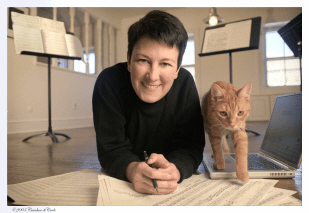
Jennifer Higdon Quotations
I recently met composer Jennifer Higdon, through an event sponsored by the American Composers Forum. We learned a good deal about her compositional process and her approach to earning a full time living as a composer, which for me, has been very inspiring.
Recently, I had the good fortune to meet Composer Jennifer Higdon and Cheryl Lawson, the co-owner of Lawdon Press, who publishes Ms. Higdon’s compositions. The meeting was sponsored by the American Composers Forum. The poet of the work, Jeanne Minahan, and the violin soloist, Jennifer Koh, were also there. Each of them talked about the The Singing Rooms piece and their experience with this collaboration. This all took place after attending a rehearsal of The Singing Rooms (see below) with the Minnesota Orchestra. It is an extraordinary piece recorded by the Atlanta Symphony and Chorus.
Jennifer Higdon is a renowned American composer of classical music as well as a flutist. She also recently won a Grammy Award for her Percussion Concerto.
She began her composition career by writing music for her instrument and then expanded her compositional career by writing a good many chamber works and pieces for orchestra, chamber orchestra and bands. She studied flute at Bowling Green State University, gained an Artist’s Diploma from the Curtis Institute of Music, earned a master’s degree and then her doctoral degree in composition from the University of Pennsylvania where she studied composition with composer George Crumb.
Higdon teaches composition on a very part time basis, at the Curtis Institute as an adjunct instructor, where she holds the Milton L. Rock Chair in Compositional Studies, thus making her one of the few modern composers who earns the bulk of her living from composition through commissions, royalties, residencies and the sale of her music through her own publishing company, Lawdon Press. (This company is co-owned and run with Cheryl Lawson.)
Her work has received an outpouring of enthusiasm by audience members and performers. Steve Smith of The New York Times said: “Jennifer Higdon’s vivid, attractive works have made her a hot commodity lately.” Robert Battey of The Washington Post said: “Higdon’s music is lithe and expert.”
Her most performed piece for large ensemble, Blue cathedral for orchestra, is a one-movement tone poem relating to the death of her brother, Andrew Blue Higdon, from melanoma. It is the most performed modern orchestral piece by a living American composer with over 200 performances since its premiere in 2000.
The Singing Rooms, a 30-minute work for solo violin, SATB chorus, and orchestra, was completed in 2007. Higdon used the poetry of Jeanne Minahan as the text for the work. It was premiered by Jennifer Koh, soloist, and The Philadelphia Orchestra on January 17, 2008, in Philadelphia. The work was co-commissioned by The Philadelphia Orchestra, Atlanta Symphony Orchestra, and Minnesota Orchestra. (Excerpted from Ms. Higdon’s website.)
Image: Composer Jennifer Higdon with an orange cat next to her
“The commission process really affects the pieces I write. I am always told two things: duration and instrumentation. I always know who will be playing the piece, and so I try to get to know the performers. If it’s a soloist, I talk to them about what they would like in their piece, and what other kinds of repertoire they select for themselves to play (this tells me a lot about the amount of lyricism versus drama that they like). So I like to think that I find a way to have the piece respond to the player and the player respond to the piece.”
“I think the only way to get new people into the concert hall is to do more new music. We live in a world where everything new is coveted and anticipated: newest sneaker, ipod, cell phone, television, computer, clothes, restaurants, cars…you name it. We now have a generation that wants an ‘event’ and the cutting edge experience.”
“I think we need more of this type of music and new music is the closest reflection of our everyday lives. The thing I love about Classical music is that it always feels to me like it reflects not only the aspects of our lives (Bach, Mozart, and Beethoven certainly did that for their lifetimes), but also of our emotional states.”
“Music written now reflects now, which is what young people are into. And people are into variety…even in their concert experiences. ….many folks want a mix of musics. And many young composers are picking up on this…they are writing music that could easily cross over into Indy bands, and they’re playing in alternative venues (like bars), and trying new modes of communication (Hilary Hahn has her own YouTube channel). I think you can bring young people to Bach, Mozart, and Beethoven, but the path to achieving it is through new music.”
– Jennifer Higdon (1962- )